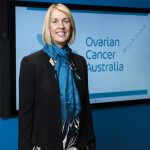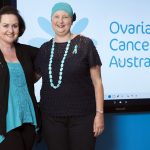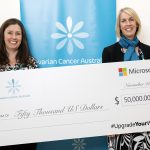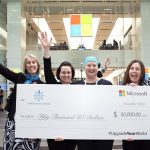1480 women are diagnosed with ovarian cancer each year, and with a survival rate of 43 per cent, it’s the lowest survival rate of any women’s cancer.
Bridget Whelan, thought her symptoms were just a normal part of life. “I went to the GP just with a general complaint of ‘something’s not quite right.’ I had persistent bloating, abdominal pain, and I saw a change in my bowel and urine habits. I actually thought that I might just have an intolerance to some kind of food.”
“I was sent for an ultrasound, and a blood test – and both of those showed something and that’s when my GP sent me to a specialist for further investigation. Often a woman’s symptoms can get dismissed as just feeling poorly or not exercising enough. I was very busy at work, and not really taking great care of myself, so it was a while before I went to the GP because I kept thinking my symptoms were just a knock on effect of what was going on in my life at the time.”
At 36, Bridget was diagnosed with Stage 3 ovarian cancer in 2010, the most common and terminal form of the cancer. This saw the start of a five year journey with numerous surgeries, radiation therapy and chemotherapies – something she will need to deal with for the rest of her life.
Bridget then had the unthinkable experience of her best friend Ann-Maree Mulders being diagnosed four years later in 2014. “Awareness is critical. Ann-Maree had the knowledge of what I went through, and therefore knew what symptoms to look for, and what conversations to have with her doctor,” said Bridget.
Ovarian cancer is a disease that often presents with abdominal pain, bloating, frequency of urination or feeling full – symptoms that could be overlooked as being less serious. And without a test to diagnose the disease, diagnosis can be tricky.
“It’s really important that women take control of their own body, because you do know when something’s wrong. Often doctors don’t make that connection because ovarian cancer is so rare in young women.”
Ann-Maree went back to the GP four times with various symptoms. “I’m a really big advocate of pushing for your own testing because, again and again, I was sent away with every possible excuse under the sun of what it could be. And in the end, I actually said, ‘Look I’ve got a friend with ovarian cancer and I’m really paranoid’ – and the doctor actually said I was being paranoid, which unfortunately I wasn’t,” said Ann-Maree.
“It’s really important that women take control of their own body, because you do know when something’s wrong. Often doctors don’t make that connection because ovarian cancer is so rare in young women.”
“Ovarian Cancer Australia, is a real lifeline for women who have just had their life turned upside down, providing all the support you need at your fingertips. They offer a wealth of information that people can draw on, along with the opportunity to reach out if you need to,” added Ann-Maree.
As part of Microsoft Australia’s Windows 10 #UpgradeYourWorldAU initiative, Australians recently helped to crowdsource five local non-profits to each receive a donation of US$50,000 – one of which was awarded to Ovarian Cancer Australia. Thanks to loyal supporters, the grant will enable Ovarian Cancer Australia to continue its great work.
“Ovarian cancer is often referred to as the ‘silent killer’, of course it’s far from silent – but we know that there is currently a very poor understanding of the detection, prevention and risk factors of ovarian cancer.”
“Ovarian cancer is often referred to as the ‘silent killer’, of course it’s far from silent – but we know that there is currently a very poor understanding of the detection, prevention and risk factors of ovarian cancer. We are extremely thankful for the community support we have received from Microsoft’s #UpgradeYourWorldAU initiative. We have a long way to go in correcting misconceptions and improving Australians’ understanding of ovarian cancer, but this is a positive step in the right direction,” said Jane Hill, CEO, Ovarian Cancer Australia.
“The #UpgradeYourWorldAU grant means a lot to all of us, as one little piece of research might mean there’s a treatment option later down the track. I’ve got two little children, and it might mean they’ll still have their mother around. It’s about giving women a chance. With ovarian cancer you often feel like you don’t have a chance, but with the work that Ovarian Cancer Australia does, we have a chance of changing that,” added Ann-Maree.
“It’s about giving women a chance.”
Microsoft is proud to be supporting Ovarian Cancer Australia. “We are committed to celebrating those who inspire others and make an impact in their community, and Ovarian Cancer Australia has made tremendous strides since it was first founded. Ovarian cancer affects so many women, their families and friends – it’s critical we all play a role in driving awareness,” said Anna Howarth, Citizenship Manager, Microsoft Australia.
“It’s really important for women to know the signs and symptoms of ovarian cancer. And if women experience them over a four week period, they should go and see their GP. As women, we need to be comfortable in having these conversations, with each other and with our doctors, because it can and will save lives,” said Jane.
February 24 marks Teal Ribbon Day, where the community is encouraged to come together and host an Afternoon Teal to increase awareness of the disease, and also raise much needed funds for Ovarian Cancer Australia’s support, advocacy, awareness and research programs.
Ovarian Cancer Australia is an independent national organisation, giving a voice to women with the disease. The organisation is working towards a brighter future, by offering support, facilitating research, driving awareness, advocacy, and most importantly supporting the women affected by the disease. For find out more information about Teal Ribbon Day, Ovarian Cancer Australia and what symptoms to watch for, visit www.ovariancancer.net.au

Anna Howarth, Citizenship Manager, Microsoft Australia, Jane Hill, CEO, Ovarian Cancer Australia

Jane Hill, CEO, Ovarian Cancer Australia

Ann-Maree Mulders, Bridget Whelan

Anna Howarth, Citizenship Manager, Microsoft Australia, Jane Hill, CEO, Ovarian Cancer Australia

Jane Hill, CEO, Ovarian Cancer Australia, Ann-Maree Mulders, Bridget Whelan, Anna Howarth, Citizenship Manager, Microsoft Australia





